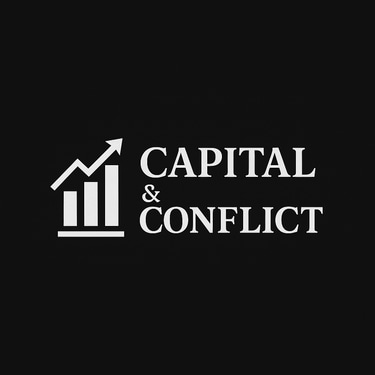Milei’s Gamble: Markets Cheer, Streets Protest
MACROECONOMIC
Elliot Smith
8/19/20253 min read


Inflation is cooling & bonds are rallying – but Argentina’s history reminds us that stability here is rarely permanent.
Chainsaw Economics: Argentina’s Bold Bet on Stability
When Javier Milei, TV celebrity-turned-politician, took Argentina’s office in December 2023, he came armed with a chainsaw – literally. His “shock therapy” agenda promised sweeping government spending cuts, mass deregulation, and radical market liberalisation to curb inflation and restore fiscal stability in Argentina.
In under two years, inflation has fallen from 211.4% to under 85%, with the IMF pledging an additional $20bn in funding to two other deals worth a combined $101bn since 2018. Moreover, Argentina’s bonds have had their strongest rally in years.
Yet, as the streets protest and critical elections approach, investors must ask: is this a turning point, or a false dawn?
From Crisis to Confidence
Known as “El Loco” (“the madman”) & “the chainsaw”, Milei, the anarcho-capitalist, was sworn into office on 10th December, 2023. His core promises included to slash public spending by 15% of Argentina’s GDP, which he was able to reduce from 25% to 2.7% by December 2024; and the dollarize the economy, which he has “blamed politics” in his failure to do so.
The pre-Milei economy had reached an all-time low: poverty exceeding 40%; economic contraction; and reserves nearly depleted – however, immediately after his inauguration, investor confidence soared: sovereign bonds rallied; spreads tightened; and the peso firmed in the parallel market. For a country accustomed to capital flight, it was a rare reversal of sentiment.
The Political Blitz
Since assuming power, Milei has moved at breakneck speed. Mass public sector layoffs have costed up to 50,000 jobs, he has vetoed pension/disability benefit increases, repealed rent controls, and closed multiple ministries to ‘slash bureaucracy’.
Most notably, he issued Decree 70/23, titled “Bases for the reconstruction of the Argentine economy”, known to many as the “mega-decree”, which deregulated (to differing levels of success) over 300 laws.
This is Argentina’s most aggressive pro-market pivot since the 1990s. The difference? This time, the moves are taking place under the watchful eyes – and more importantly conditional funding – of the IMF.
Inflation Cools, Bonds Rally… But Jobs Vanish
Inflation is the headline win. However, other areas prevail - the Peso’s parallel market premium has narrowed from nearly 150% to 40%. Reserves have been bolstered by the $12bn upfront imbursement from the IMF deal in April 2025, giving the central bank more firepower to defend the Peso.
Argentina’s risk index has fallen below 500 basis points – its tightest level since 2018, with sovereign bonds surging. FDI has also made a return, with 2024 seeing 99 deals valued at $8bn, the highest seen since 2018, led by energy, infrastructure, and agribusiness.
But there’s a darker side. Protests, like the 12th March pensioner-led demonstration, have been rampant, as a result of the social costs of “shock therapy”. The labour market has faced the most damage – 115,000 private jobs have been lost, with informal employment up by 224,000 and unemployment reaching 7.9% - its worst since 2021.
What’s Next for Markets & Industries
For bondholders, the focus is on whether Milei can stay the course. Every IMF review is now a market event – so far so good, with the first review being completed at the end of July, with the IMF assessing that “program implementation has been strong, reflecting appropriately tight policies”. However, a missed target could send spreads back to distressed levels, and the peso’s newfound stability hinges on credible fiscal execution, and continued reserve accumulation.
Energy and utilities are entering a new, prosperous era. With subsidies removed, tariffs are being repriced to cost-recovery levels – freeing up space for private capital. A key winner is exporters, standing to benefit from deregulation and reduced export taxes.
However, the banking sector meets resistance: high real interest rates lock domestic credit demand at weak levels, but they also attract foreign portfolio inflows. If Milei pushes it through – capital market liberalisation could reopen Argentina’s equity and debt channels to global investors.
The takeaway message is that the political calendar is the wildcard. September & October face provincial elections and midterms, respectively, which could shift the balance of power in congress, leading to a strengthening of Milei’s hand – or compromise.
Policy Risks & the Investor Takeaway
“Shock therapy” has already triggered mass protests, strikes and legislative pushback. Poverty remains above 40%, and a populist counter-movement is being fuelled by the social cost of austerity. IMF conditionality demands strict adherence to fiscal targets, but over the coming months, political realities could force backsliding.
For investors, today’s Argentina is the ultimate high-beta EM trade. Stay the course, and you could be looking at the most significant market re-rating in Latin America since Brazil’s 1994 Real Plan. However, the reversal could be equally as violent if political hurdles cause a fall.
In other words: enjoy the rally, but keep your exit close at hand.
Insights
Exploring political risk and financial market impacts. This is not financial advice.
Analysis
Trends
© 2025. All rights reserved.
